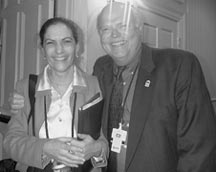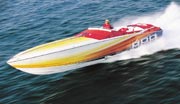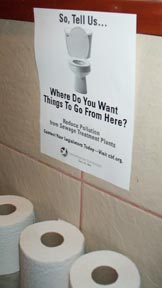|
|
Dock of the Bay
Maryland Department of Environment Headless No More
Ken Philbrick earns his job
“What a difference a year makes!” crowed Eastern Shore Sen. J. Lowell Stoltzfus as Kendl Philbrick’s nomination sailed through the Maryland Senate’s Executive Nominations Committee. A year ago in that same committee, the nomination of Lynn Buhl, the woman Gov. Robert Ehrlich had intended as Philbrick’s boss, mired in controversy as thick as some of the goo Maryland Department of the Environment cleans up.
“It’s a different candidate,” noted Senate President Thomas V. Mike Miller sotto voce as congratulations rose.
Cheers came not only from the Department of Environment staffers who had packed the committee room in support of the man who’d been their acting boss for 10 months. Senators, too, seemed glad to have resolved a year’s lingering conflict. Republicans on the committee were all grins and glad hands, while Democrats professed themselves satisfied. Philbrick’s wife Cindy beamed. Even environmentalists said they were resigned if not overjoyed.
All agreed that Philbrick had earned his job as secretary of Maryland Department of the Environment.
In making his case, Philbrick first salved old wounds. “Everyone has a seat at the table,” he said, reversing a dismissal of the environmental community left over from last year. “I’ve reached out to the environmental community,” he said. “I’ve listened and learned from them.”
 |
photo by Sandra Martin
“I caught her in a moment of weakness,” says Kendl Philbrick, newly confirmed MDE secretary of his grip on Dru Perkins-Schmidt of 1,000 Friends of Maryland. |
Then Philbrick offered up a list of commitments highlighted by a few 2003 achievements. Five of the commitments — reducing air pollution, nitrogen from sewage treatment plants and environmental poisonings of children; returning brownfields to productive use and continuing enforcement and compliance — are what you’d expect from the department charged with cleaning up Maryland’s messes. One that Lynn Buhl didn’t rise to — environmental justice — scored extra points for Philbrick.
The former commercial real estate manager twice touted environmental justice among his goals. He was speaking, Philbrick said, not only of regulation but also reaching out to communities whose problems are compounded by pollution.
Rising to that discussion were senators who’d been alienated when Buhl shied away from the human angle.
Asthma and emphysema as human effects of air pollution worried Baltimore County Sen. Delores G. Kelley, vice chair of the committee. Philbrick admitted the link and promised to pay attention even as he pointed outside Maryland to federally regulated Midwestern factories and power plants as the cause of the pollution.
Buhl’s dismissal of land- and rubblefills a year ago cost her the vote of Sen. Ulysses Currie. Since then, Philbrick has made peace. Philbrick had “reached out,” the Prince George’s County senator said. “I believe he’s committed.”
Even Buhl’s fiercest opponent, Montgomery County Sen. Brian Frosh, seemed won over. Where Buhl had been battered with questions, Philbrick got but a little push as Frosh challenged his claim that 80 percent of Maryland’s air pollution comes unwanted from the Midwest.
Philbrick accepted the friendly amendment, admitting his figure represented the high level, not the range.
As discussion of the nominee rounded the table, Democrats and Republicans alike praised Philbrick for reaching out to them. That much even environmentalists had to admit.
“To his credit, he’s reached out to the environmental group,” said League of Conservation Voters’ Susan Brown. Still, Brown said, she’d wait and see. “MDE has a pretty big environmental package this legislative session, including the flush fee bills,” she said. “We’ll see how hard they work to lobby these bills.”
Philbrick had done so well for himself that when the question was called, his nomination didn’t merit special consideration. The secretary of Maryland Department of the Environment got approved right along with dozens of other nominees from boards and commissions ranging from Rural Legacy to Racing to Radioactive Wastes.
As hugs and cheers broke out, Baltimore and Carroll counties Sen. Larry Haines had the last word. No matter where you come from, he said, what matters is how you operate “person-to-person.”
— SOM
to the top
Speed Kills
As winter thaws, speedboats head into the Bay
As winter thaws on the Bay, boaters sick of being cooped up find the still-frigid waters too alluring to pass up.
But it’s not all fun and games on the Chesapeake.
A horrific February 29 accident where, witnesses say, a speedboat hit a wave, became airborne and flipped over, killing one man and leaving another missing brought home the dangers of speed on the Bay.
“How these people go rip-roaring through the Bay is beyond me,” says Tracy Morgan, a hydrofoil racer from Annapolis.
Morgan knows a thing or two about speed. She is trained to pilot professional racing boats that go in excess of 100 miles per hour. She loves the adrenaline rush of the speed, but she is all too familiar with the dangers.
“I feel safe out there,” she says, “because there are trained fire teams and rescue workers on the shore, the boats are equipped with state-of-the-art safety features, and we spend hours on techniques and safety procedures in the event of an accident. Even with all that, bad things happen.”
 The courses Morgan races are Coast Guard-approved inlets similar to those waters skiers prefer: Smooth, glass-like stretches of calm water. The slightest wave at the speeds she races can send her airborne and cartwheeling across the water into a barrel roll. The courses Morgan races are Coast Guard-approved inlets similar to those waters skiers prefer: Smooth, glass-like stretches of calm water. The slightest wave at the speeds she races can send her airborne and cartwheeling across the water into a barrel roll.
Basic physics dictate that at 50 miles an hour, a boat hits a two-foot wave with the same result.
The difference is, weekend boaters on the Bay don’t have hours of safety training and rescue crews a few yards away.
Speed’s danger is compounded this time of year. In the excitement of getting back onto the water, boaters forget that even if air temperatures are in the 60s and 70s, the water temperature is just above freezing.
The Maryland Department of Natural Resources did not return phone calls for this story, but its web site notes that “Sudden immersion in cold water can induce rapid, uncontrolled breathing, cardiac arrest and other life-threatening situations which can result in drowning.”
DNR encourages boaters to wear life jackets, but former Maryland and national Marine Trades lobbyist Mick Blackistone of Fairhaven says making life jackets mandatory for speeding boaters is difficult.
“There is no strong support at this time,” he said. “It’s not an issue legislators pay attention to.”
He has even less faith in slowing boaters down.
“These guys get out in the open Bay and can do anything they want,” says Blackstone. “When they can get from the Baltimore Harbor to Annapolis in 30 minutes, the Marine Patrol can’t catch them, just like police can’t catch people on speedier motorcycles.”
Some high-end boats cost more than $200,000 and boast a stunning 470 horespower — almost 80 horsepower more than a Ferrari 360 Spider. “This boat will cruise all day long at 55mph and a top speed of over 80mph,” says eGlobalYachts.com, a website promoting Cigarette Boats.
When it comes to legislating safety, Blackistone is pessimistic.
“There’s nothing we can do about it. The issue is too controversial. We’ve talked about speed zones, but they are unenforceable. And, in the end, if you buy a boat, you have a right to do whatever you want.”
— Louis Llovio
to the top
The Bay Starts Here
Chesapeake Bay Foundation leverages flush tax at its source: your toilet
The Bay’s biggest advocacy group is working alongside Gov. Robert Ehrlich, flushing out support as his proposed Chesapeake Restoration Fund snakes its way through the legislature.
Chesapeake Bay Foundation is reaching out to find friends for the flush tax in high-traffic areas where the customer is captive: bathrooms in bars.
Going up in restrooms throughout Annapolis, Baltimore and the Eastern Shore are ads that coincide with a radio and print campaign.
One shows an open toilet seat with the message “Don’t make this your only contribution to the Bay” in bold lettering across the front. Another shows a bathroom complete with toilet and urinal and the words “If you’re the Chesapeake Bay ... this is your chamber of horrors.”
 The messages are designed to alarm. The messages are designed to alarm.
“We are urging citizens to call their legislators, to let their delegates know how important this issue is,” said Susan O’Brien, spokeswoman for the Foundation.
At issue are identical House Bill 555 and Senate Bill 320, which propose upgrading Maryland’s sewage treatment plants to reduce nitrogen pollution. The money would be raised by a $2.50 per month “user-fee,” as the governor calls the tax, for all households flushing into pubic sewage treatement systems.
Some lawmakers want amendments that would include septic system users.
The flush tax is how the governor plans to pay for upgrading sewage treatment in Maryland’s 66 biggest plants. Those plants produce 95 percent of the treated sewage flowing into the Bay. The nitrogen still loading even treated wastewater is one big cause of the Bay’s decline, represented by last summer’s dead zone stretching 150 miles from the Bay Bridge to the York River in Virginia. Dead zones are areas with too little oxygen to support life.
Deliberation on the bills began in the House Environmental Matters Committee March 3 and continues in the Senate Education Health and Environmental Committee March 11. Meanwhile, supporters hope the ads will bring a steady stream of phone calls to state legislators.
“We need to do whatever we can to return to the way things used to be,” said Jeff Maguire, who has placed the notices in the restrooms at Boatyard Bar and Grill.
“We want people to know just how important this is,” said Theresa Pierno, vice-president of CBF. “They can play a part in the solution.”
— Louis Llovio
to the top
Kirchen Hit with Six Wammies
Regional awards honor Calvert County guitarist plus other familiar players
Washington Area Music Association has again thrown a pile of its annual Wammie awards at musician Bill Kirchen, leader of the band Too Much Fun and until recently a Calvert County resident.
 |
| Before leaving Chesapeake Country for Austin, guitar legend Bill Kirchen scooped up six Wammies. |
Kirchen, already a WAMA Hall of Famer, took home six awards, including Entertainer of the Year. “I think they award my all-around effect as an entertainer,” he says. “They certainly are a welcome validation of my presence here for the past 17 years.”
WAMA embraces all musical styles from classical, bluegrass, go-go, R&B, reggae, rock, jazz and folk. Members include musicians, concert promoters, lawyers, recording engineers, managers and graphic artists who nominate area musicians for Wammie awards. The top five in each of 21 categories gain a slot on the final ballot.
Kirchen’s feelings for the Wammies goes deep. On his way to Texas [Vol. XII, No. 7; Feb. 12], he said, “the Wammies remind me what a varied and rich musical environment I lived in here, and what a wonderful and inclusive organization WAMA has been.”
Listen to the sound of fame on Bill Kirchen and Too Much Fun’s winning recording Dieselbilly Road Trip.
Also check out Wammie winners Ruthie and the Wranglers on their album Someday. Multiple Wammie winner Ruth Logsdon and her group appear from time to time at Rams Head in Annapolis.
Other familiar names on the Wammie-winning list are blues artist Deanna Bogart, champion fiddler Bonnie Rideout and her trio and gospel group Sweet Honey in the Rock.
— Sonia Linebaugh
to the top
Way Downstream …
In Virginia, scientists are evaluating a potentially troubling finding as they weigh the risks and benefits of introducing Asian oysters in Chesapeake Bay. Virginia Institute of Marine Science researchers announced last week studies on Asian oysters discovered two parasites similar to the organisms that have all but wiped out our Chesapeake variety …
In London, the grocer Sainsbury’s has introduced its new black tomato amid some peculiar hype. The sweet Kumato, which originated in the Galapagos Islands, is said to have enhanced the sex lives of tortoises …
Our Creature Feature comes from Rome, where animals in the rich town of Reggio Emilia are exultant over the good fortune that has come their way. Under a new ordinance that goes into effect this week, people must begin pampering their pets with more kindness than humans typically display toward one another.
From now on, dogs must have spacious dog houses in shady locations, and it is a misdemeanor to keep a canary alone. Even lobsters are getting a break: It will be unlawful to throw them into a pot alive. “It’s useless torture. They should be killed first,” a town spokeswoman told Reuters while explaining the new anti-cruelty laws.
to the top
|
|


 The courses Morgan races are Coast Guard-approved inlets similar to those waters skiers prefer: Smooth, glass-like stretches of calm water. The slightest wave at the speeds she races can send her airborne and cartwheeling across the water into a barrel roll.
The courses Morgan races are Coast Guard-approved inlets similar to those waters skiers prefer: Smooth, glass-like stretches of calm water. The slightest wave at the speeds she races can send her airborne and cartwheeling across the water into a barrel roll.  The messages are designed to alarm.
The messages are designed to alarm.